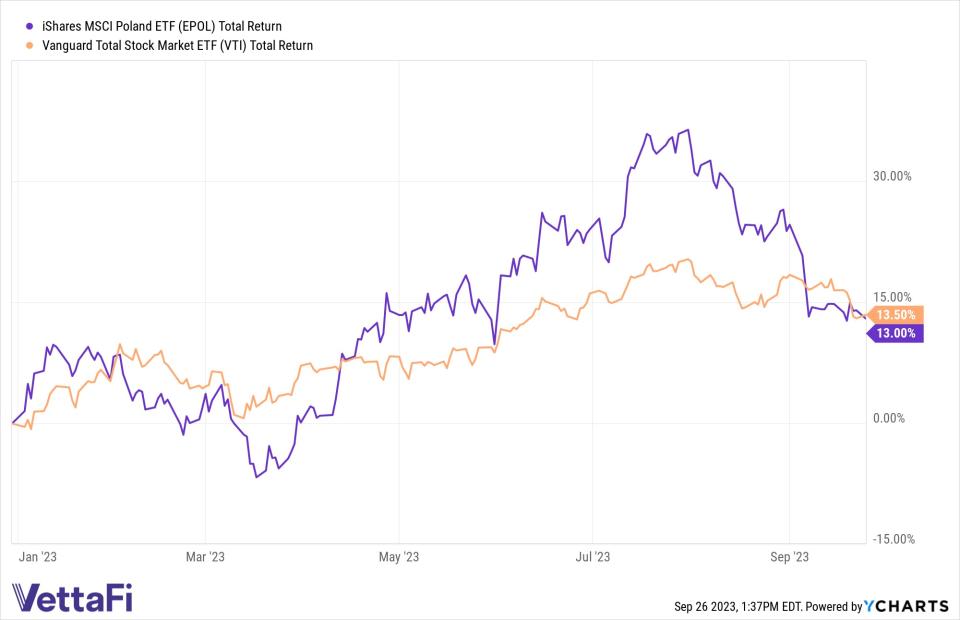Despite War in Ukraine, Polish Stocks Up YTD
This article was originally published on ETFTrends.com.
The Russia-Ukraine war entered its 19th month in the second half of September. Despite this, the violence shows no signs of letting up. Of course, ripple effects emanating from Ukraine have spread across eastern Europe and throughout the rest of the continent. Those effects impact every aspect of life, including investing and, potentially, the prices of every asset class. Interestingly, the Polish stock market, the only eastern European equity market easily accessed via a dedicated U.S.-listed ETF, is up nearly as much as the U.S. market.
Challenges Tracking Equity Valuations in Eastern Europe
As a result of the invasion, MSCI quickly removed Russian securities from its emerging markets indices in March 2022 -- less than a month after Russia invaded Ukraine. Already at that time, an overwhelming majority of market participants were seeing the Russian market as "uninvestable" due to the war.
Currently, it's extremely challenging to get an idea of what equity valuations look like in eastern Europe. Although Russian equities are still trading within the nation's borders, foreign investors are no longer able to trade them.
Meanwhile, the Ukrainian stock exchange has temporarily halted trading due to the war. Elsewhere in the region, information about valuations is also limited. In fact, about the closest we can come to gauging equity valuations anywhere in eastern Europe is by looking at the MSCI Emerging Market Eastern Europe ex-Russia Index, which includes 20 stocks in Poland, Hungary, and Czechia.
However, Poland dominates the index, with Polish stocks accounting for eight of the top 10 positions, with Hungary's OTP Bank and Czechia's CEZ Ceske Ener Zavody utility company rounding out the top 10 at the end of August. In 2022, the MSCI EM Eastern Europe ex-Russia Index plunged 26%, although it rallied in a big way in the first seven months of 2023, climbing an impressive 34%.
Polish Stocks, EPOL Outperforming
At this point, many ETFs with exposure to Russia or Ukraine have shut down entirely or shed those individual exposures. As a result, there is only one ETF with very slight indirect exposure to Ukraine still in operation. It's not even trading Ukrainian securities but rather Polish stocks.
Aside from Ukraine itself, neighboring Poland shares a fairly long boarder with the country. As a result, the iShares MSCI Poland ETF (EPOL) does face some level of indirect impact from the war. However, EPOL is up 54% over the past year through the end of business on Sept. 25 based on VettaFi data, including a 13% year-to-date gain.
In fact, the Poland ETF was one of five country ETFs that outperformed the S&P 500 during the second quarter. It also has outperformed the Vanguard FTSE Europe ETF (VGK), which is up 29.5% for the 12-month period and 7.8% year-to-date.

Financials Are EPOL's Largest Sector
As of August 30, MSCI's Poland index was trading at a forward P/E multiple of 7.3. EPOL holds 32 Polish stocks, and the vast majority of its positions are in the financial sector, which accounts for nearly 40% of its portfolio. EPOL's top 10 holdings are:
Orlen SA (energy)
Powszechna Kasa Oszczednosci Bank (financials)
Pzu SA (financials)
Bank Pekao SA (financials)
Dino Polska SA (consumer staples)
KGHM Polska Miedz SA (materials)
LPP SA (consumer discretionary)
Santander Bank Polska SA (financials)
Allegro SA (consumer discretionary)
CD Projekt SA (communication)
Although EPOL doesn't contain any Ukrainian companies, some Ukrainian companies are listed on the Warsaw Stock Exchange. For example, Kernel, one of the largest producers of sunflower oil in the world, is in the process of delisting from the Warsaw Stock Exchange after the Polish regulator said in June it would clear the way for the departure, though the latest updates indicate that won't finalize until next month. Much of Kernel's roughly 60% year-to-date decline in Warsaw has come since the June announcement.
Unfortunately, we probably won't see any lasting recovery in the shares of most Ukrainian companies until the war in Ukraine is firmly in the rearview mirror.
VanEck to Finish Winding Down Its Russia ETF
Meanwhile in Russia, most ETFs focused on the country have already been shut down, although VanEck was one of the last to start winding its fund down. The firm finally did begin to liquidate its VanEck Russia ETF (RSX), which was the first U.S. ETF focused on Russia, starting with an initial liquidation distribution in January 2023.
The Cboe BZX Exchange had halted trading on RSX in March 2022 and then delisted the fund from the exchange in January 2023. Russian securities have been assigned a valuation of zero because economic sanctions imposed since the war began are preventing the sale of those securities.
A second distribution from VanEck's RSX ETF was sent in late July. Liquidation is expected to be complete no later than December 2023, although VanEck warned that it could take much longer, given that shutting down an ETF is a complicated process.
Despite War, Companies Continue to Invest in Ukraine
The relatively strong performance of EPOL and MSCI's Poland stock index offers a glimmer of hope for eastern Europe, as do the recent investments by multiple companies in Ukraine, even during wartime. It seems many firms are committed to the social aspect of supporting the nation at a time when a resolution to the conflict may seem far away.
According to UkraineInvest, the Ukrainian government's official investment arm, some well-known, publicly traded foreign companies that have invested capital into the country during the war include Bayer, Nestle and ArcelorMittal, among many others.
Charts via TradingView.
For more news, information, and analysis, visit the Equity ETF Channel.
POPULAR ARTICLES AND RESOURCES FROM ETFTRENDS.COM
